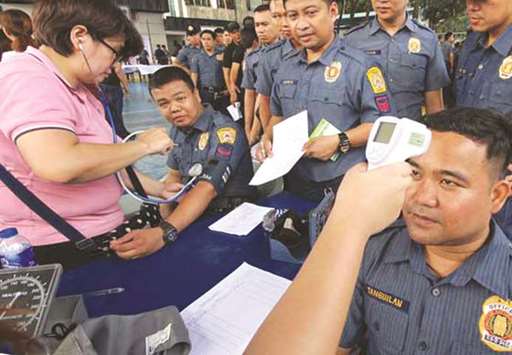Hundreds of Quezon City policemen who were inoculated with Dengvaxia will be monitored by the Philippine Children’s Medical Center (PCMC) to determine if any of them will develop severe dengue.
The hospital on Sunday started the profiling of the policemen and their dependents who were administered the dengue vaccine.
“We have a mandatory profiling to get their immunisation history. We will also start the surveillance of those who got the vaccine,” PCMC executive director Julius Lecciones said.
The PCMC conducted a free vaccination programme for the police and their dependents at the Quezon City Police District (QCPD) at Camp Karingal in Quezon City in September.
According to a police report, 839 personnel and 498 walk-in patients received their first shot of Dengvaxia. Of the 1,337 beneficiaries, only 89 or 7% had a history of dengue.
QCPD Health Service Chief Inspector Josephine Nandu said the beneficiaries of the free vaccination programme were to get their next shot in February 2018, but this has been cancelled because of the decision of the Food and Drug Administration to recall Dengvaxia from the market.
French pharmaceutical giant Sanofi Pasteur, the maker of the vaccine, recently revealed that the vaccine may cause a more severe case of dengue for first-time patients.
The PCMC said 6,699 members of the Philippine National Police were given the vaccine.
Lecciones gave assurances that the hospital will monitor for five years those who were inoculated with Dengvaxia.
“We will continue to monitor the policemen because we are obliged to. We will also discuss with Chief Supt. Eleazar what other assistance we can give them,” he told Manila Times.
PO1 Ian Bangayan, one of the police officers who got a shot of the vaccine, has lingering worries on the possible effects of Dengvaxia.
“I have plenty of questions that need to be answered. From now on if I get vaccinated, I will find out the effects of the vaccine,” Bangayan said. The police officer said he had no history of dengue when he was vaccinated on September 17.
Eleazar urged members of the QCPD and their dependents not to panic. He urged policemen to observe the 4 o’clock habit, a strategy that mobilises communities to “search and destroy possible mosquito-breeding places” at 4pm daily.

A nurse checks the temperature of a policeman who was vaccinated with Dengvaxia in September.
